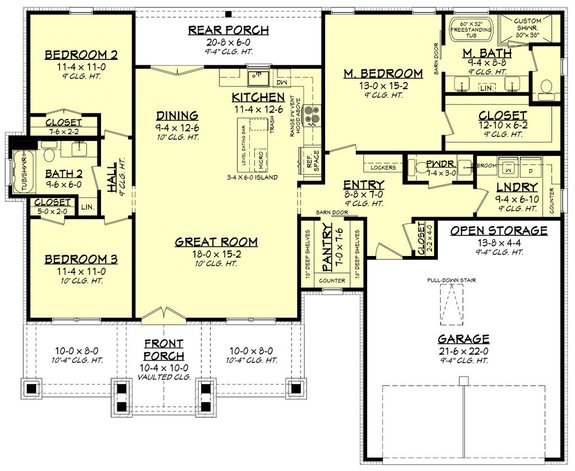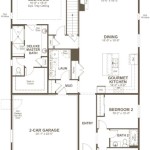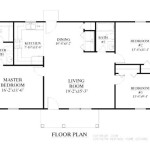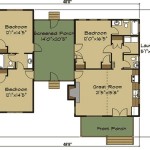4 Bedroom House Plans with Basement: The Ultimate Guide to Designing Your Dream Home
Are you dreaming of building your own 4 bedroom house with a basement? Whether you're a first-time homebuyer or an experienced homeowner, designing your own house can be a daunting task. But with the right planning and guidance, you can create a home that perfectly suits your needs and lifestyle.
In this article, we'll take you through everything you need to know about 4 bedroom house plans with basement, including:
- The different types of basement floor plans
- The pros and cons of adding a basement
- Important design considerations
- Tips for saving money
By the end of this article, you'll have all the information you need to start planning your dream home.
Types of Basement Floor Plans
There are many different types of basement floor plans to choose from, each with its own advantages and disadvantages. Some of the most popular types of basement floor plans include:
- Walkout basement: This type of basement has a door that leads directly to the outside, making it easy to access your backyard and other outdoor areas. Walkout basements are typically more expensive to build than other types of basements, but they offer a number of advantages, such as increased natural light and ventilation.
- Garden-level basement: This type of basement is partially above ground, with one or more walls exposed to the outside. Garden-level basements are typically less expensive to build than walkout basements, but they don't offer as much natural light or ventilation.
- Full basement: This type of basement is completely below ground, with no windows or doors to the outside. Full basements are typically the most affordable type of basement to build, but they can be dark and cramped.
The type of basement floor plan that you choose will depend on a number of factors, including your budget, the size and shape of your lot, and your lifestyle.
Pros and Cons of Adding a Basement
Adding a basement to your home can be a great way to add extra space and value to your property. However, there are also a few potential drawbacks to consider before making a decision.
Pros of adding a basement:- Increased living space
- Increased storage space
- Potential for increased home value
- Protection from the elements
- Increased construction costs
- Potential for flooding
- Dark and cramped (if not properly designed)
- Difficult to access (if not a walkout basement)
Ultimately, the decision of whether or not to add a basement to your home is a personal one. Be sure to weigh the pros and cons carefully before making a decision.
Important Design Considerations
If you're considering adding a basement to your home, there are a few important design considerations to keep in mind.
- Natural light: If you want your basement to be a comfortable and inviting space, you'll need to make sure that it has plenty of natural light. This can be achieved by adding windows, skylights, or a walkout door.
- Ventilation: Basements are naturally damp and musty, so it's important to make sure that they have adequate ventilation. This can be achieved by installing a ventilation system or by opening windows and doors when possible.
- Ceiling height: Basement ceilings are typically lower than ceilings on other floors of the house. This can make the basement feel cramped and uncomfortable. To avoid this, make sure that your basement ceilings are at least 8 feet high.
- Storage space: Basements are often used for storage, so it's important to make sure that there is plenty of space for your belongings. This can be achieved by adding built-in shelves, closets, or drawers.
- Egress: All basements must have an egress window or door that leads directly to the outside. This is important for safety in the event of a fire or other emergency.
By following these design considerations, you can create a basement that is comfortable, inviting, and functional.
Tips for Saving Money
Adding a basement to your home can be a significant investment. However, there are a few things you can do to save money on the project:
- DIY some of the work: If you're handy, you can save money by doing some of the work on your basement yourself. This could include things like framing, drywalling, and painting.
- Shop around for materials: Don't be afraid to shop around for the best prices on materials. You can often find significant savings by comparing prices from different suppliers.
- Hire a contractor who specializes in basements: If you're not comfortable doing the work yourself, be sure to hire a contractor who specializes in building basements. This will help to ensure that the job is done right and that you get the most value for your money.
By following these tips, you can save money on your basement project without sacrificing quality.
Conclusion
Adding a basement to your home can be a great way to add extra space and value to your property. However, it's important to carefully consider the pros and cons before making a decision. If you decide to add a basement, be sure to follow the design considerations and tips in this article to create a basement that is comfortable, inviting, and functional.

House Plan 348 00192 Traditional 2 805 Square Feet 4 Bedrooms 3 Bathrooms Basement Plans Bedroom New

Four Bedroom Home Design With Office Plan 4968

Four Bedroom Ranch House Plan 2207 Basement Plans One Level Family

Versatile Spacious House Plans With Basements Houseplans Blog Com

4000 Sf Contemporary 2 Story 4 Bedroom House Plans Bath 3 Car Garage Two Open Floor Basement

Attractive 4 Bedroom Split House Plan 11774hz Architectural Designs Plans

2 Story 4 Bedroom Layout

4 Bedroom 2500 Square Foot House Plan With Bonus Room 11712hz Architectural Designs Plans

3500 Sf 4 Bedroom Single Story Home Plan 3 Bath Basement Garage Car Chicago Peoria Springfi Level House Plans

Walkout Basement House Plans With Photos From Don Gardner Houseplans Blog Com








